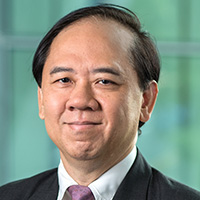To raise the productivity of our workers locally and our competitiveness globally in the post-COVID era, one strategy to ensure Singapore’s long-term survival will be to continue to attract top talent from abroad to Singapore in the same way we attract foreign investments into Singapore. Both have positive spin-offs for our Singapore economy to thrive in the long term and look intuitively to be the right policy to adopt.
The competition for foreign talent has heated up and taken a global stage. Countries like Germany and the UK had recently announced measures to further incentivise talent from abroad to move to their countries. Singapore too cannot rest on its laurels. While Singapore already has many conducive factors that attract and retain talent, the challenge is to be more selective and reach out and incentivise the cream of the top talent for key growth sectors to really consider coming to Singapore. This will enable Singapore “to shine brightly as a hub of innovation, entrepreneurship and growth. Ultimately, this leads to the creation of better jobs and more opportunities for our people.
We are not starting from ground zero, though. Our investment pipeline has not dwindled even when the pandemic situation first escalated in 2020, and continue to be strong as we recover from the pandemic, thanks to the efforts by institutions such as the EDB. When global companies such as BioNTech decided to establish their regional headquarters for Southeast Asia in Singapore, they also bring with them key management staff. We are also successful in setting up new family offices and this is despite the recent raising of the bar (e.g. a minimum fund size of $20 million by two years) which has the desirable effect of making them more treasured among the high net worth individuals (HNWIs).
Currently, we also have schemes such as EDB’s Tech Pass program to attract and retain top talent, particularly in the technology industry. We need to further improve on these schemes to reach out to more sectors that have high growth potential, for example, artificial intelligence, Fintech, data science and analytics, digital and internet marketing, and biomedical and biotechnology to name a few.
This is particularly so when the post-pandemic world presents a window of opportunity to bring more talent to Singapore. Leveraging on Singapore’s brand name in the global stage to entice foreign talent to relocate and live in Singapore makes the most economic sense, and the simplest, fastest and most effective way is to provide citizenship and resident status.
In deciding whether to relocate and come over to Singapore to work and/or stay, the HNWIs will be look at a number of factors. One important area is the personal tax rates here which are currently low by international standards. Although the government had already announced an increase in the effective tax rates of particularly the higher income individuals with the introduction of two new income tax bands of 23% and 24%, these will not significantly dent our competitiveness. These higher taxes affect all higher income taxpayers with chargeable income above $500,000 equally, and there is no merit to create lower rate for foreign talent just to encourage them to relocate here.
Just like an individual looking for their life partner will be drawing out a list of positive attributes that they want to see in their future spouse, so will a prospective foreign talent looking to move to Singapore be looking at whether the nation has enough favourable factors to make them act. In this aspect, besides having a competitive personal tax structure, Singapore consistently scores high too in a number of non-tax factors. These include an excellent education system, political stability, global connectivity, rule of law and a safe country not just in respect of low crime rates but also one that is free from natural disasters such as flood, earthquakes and typhoons. Recently, we have added another accolade. Our handling of the pandemic has earned us international praise and provide investors with the added confidence of staying in Singapore whether during their employment stint here or for the long term should they pursue citizenship of permanent resident status.
Can we do more to attract more global talent here? For example, should we emulate the recent measures adopted by Germany and the UK?
Allowing skilled professionals to live here in the city before getting a job in Singapore certainly has its merits, and it is easy to implement, as long as we do not overly favour them at the expense of citizens looking at the same housing type. Granting special visas to graduates from reputable universities for them to stay longer in Singapore before they are employed also will send a strong signal for them to “think seriously about coming to Singapore”. In this regard, we have to also be selective and only target top graduates from these good universities.
Whatever form it takes, we should first make the first move to signal to the potential foreign talent that they are very welcome to join our community. We should be bold in recommending measures that will make them “sit up, pay attention” to show that we are serious and sincere in our offer to them.
The article is an edited version of the first one published in CNA.




